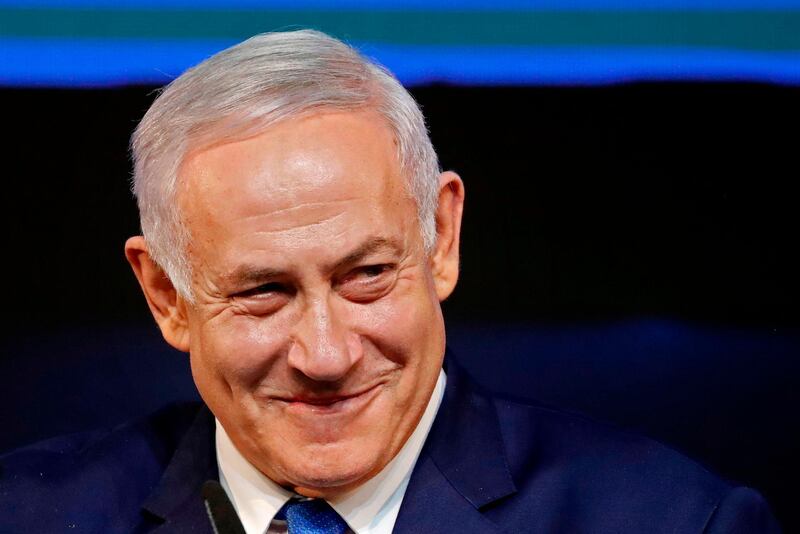In a remarkably tight election, incumbent Israeli Prime Minister Benjamin Netanyahu has emerged victorious over his challenger Benny Gantz, a former Israeli general. With Mr Netanyahu's Likud party marginally ahead of the Blue and White party, but neither with a clear majority, it is looking likely that the prime minister will be asked to form a coalition government. He is already deep in talks with right-wing and ultra-Orthodox parties, which are expected to back him and make him Israel's longest-serving prime minister, further entrenching right-wing views in Israel's political mainstream.
Given the close nature of the race, it is tempting to think this election sets a new tone for Middle Eastern politics, but it doesn't. That tone was set some years ago. Even though this race was won by the slimmest of margins, the leading candidates didn't offer fundamentally different visions of the future. Rather, Mr Netanyahu's re-election demonstrates that Israelis want to continue the status quo and believe that the sitting prime minister is the right person for that job, despite – or, perhaps, because of – the toxic nature of his last tenure and his dirty electioneering. As Hanan Ashrawi, of the Palestinian Liberation Organisation, said: "Israelis overwhelmingly voted for candidates that are unequivocally committed to entrenching the status quo of oppression, occupation, annexation and dispossession in Palestine and escalating the assault on Palestinian national and human rights. They have chosen an overwhelmingly right-wing, Xenophobic and anti-Palestinian parliament to represent them. Israelis chose to entrench and expand apartheid."
It was an election in which voters were given the limited options of centre-right, right and far-right policies. This has not happened in a vacuum. Left-wing liberal Israelis have been incrementally edged out of the political spectrum for years. It should come as little surprise that Israelis voted to further entrench their occupation over the West Bank and to perpetuate the division of the Palestinian people. A decade ago, most Israelis might have said that the occupation was unsustainable and a peace agreement was the only way to secure the country’s future. What we have learned from Mr Netanyahu’s victory, however, is that Israelis now firmly believe the status quo is the solution to the conflict.
Israel governs the entire territory between the Jordan River and Mediterranean Sea, with varying legal classifications for residents, ranging from full rights to no rights. Mr Netanyahu, along with virtually all the major candidates, implicitly campaigned on the notion that this situation was significantly better than any one or two-state solution. With no pressure from internal or external sources on Israel to change, it is hard to fault voters for believing they can continue on their current path for the foreseeable future.
voters were given the limited options of centre-right, right
and far-right policies
And what of the rise of the right-wing parties and their inflammatory rhetoric, or Mr Netanyahu’s last-minute promise to annex more settlements if he secures victory? Indeed, these elements were prominent throughout the election campaign but they did more than rationalise Israel’s position. By introducing hard-right ideas into mainstream political discourse, the debate shifted fundamentally to the right. This is nothing new in Israeli politics as the shift began many years ago. What it has done, however, is legitimise and normalise the explicit racism expressed towards Palestinians by making it part of the national dialogue.
The response from the international community has been muted and, in some cases, positively effusive. US President Donald Trump rewarded Israel’s intransigence by recognising its claim to Jerusalem and to the disputed Golan Heights. The Israeli economy is booming, thanks to a cutting-edge technology sector. Little wonder, then, that Israelis imagine this status quo will go unchallenged.
Palestinians, by contrast, find themselves divided and largely ignored by the rest of the world. The Palestinian leadership is in utter disarray. Unpopular and ineffective, Palestinian Authority President Mahmoud Abbas appears to be out of ideas and options to revive a sense of community and purpose in Palestine. Hamas, which controls the besieged Gaza Strip, is hanging onto power.
The fragmented and divided nature of Palestinian politics today reveals just how efficient Israel has been in its use of the classic tactic of divide and rule – literally, in the separation of the West Bank and Gaza, as well as figuratively. Since the beginning of the conflict, Israel has exploited fracture lines among Palestinians to its benefit. A divided Palestinian people is a critical component of Israel’s status quo and virtually every major candidate in this election promised more of the same. It is no wonder that voting figures among Palestinian citizens of Israel were historically low, according to early exit polls.
If there is anything encouraging about the gloomy state of Israeli politics, it is that the international community is no longer bound by any misconceptions concerning Israel’s intentions. The idea that Israelis are yearning for peace can finally be retired. Tel Aviv used the Oslo peace process to entrench its occupation to a virtually permanent degree. In so doing, Israel destroyed any prospect for an equitable two-state solution. It managed to do this while growing its economy and winning recognition for its aggression in Washington. As such, Israel today is exactly the country most of its citizens want. For the overwhelming majority of voters, the ultimate peace solution is one whereby the country has to sacrifice nothing to gain everything.
This development is far from revolutionary in the history of similar conflicts. South Africa’s white minority didn’t decide one day to end the apartheid system by themselves. They only did so when the world left them no choice. Israel’s choice for continued occupation should be a wake-up call for the international community that left to its own devices, it will choose domination over peace. We can no longer be under any illusions to the contrary.
Joseph Dana is the editor of emerge85, a project exploring change in the emerging world and its global impact





